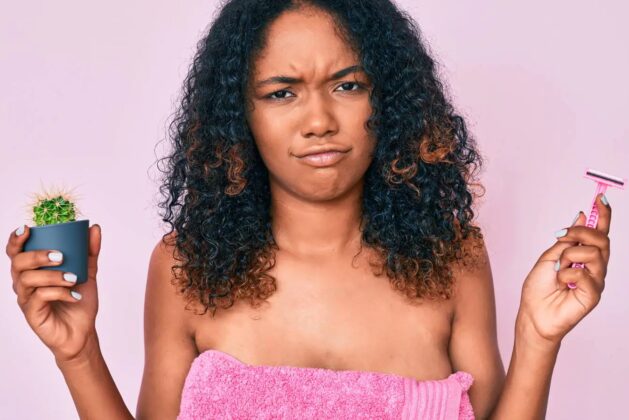[ad_1]
There are many ways to remove facial or body hair, but shaving is considered the most convenient, cheap, easy and painless way to get rid of unwanted hair. And naturally, a lot of women choose it. Still, some women avoid shaving.
Although shaving is the fastest, easiest and most convenient method of hair removal, no worries about wax strips, no hassle of going to the salon, which is why many women especially like it, but generally women believe that shaving, which makes the skin color black (true the shaving myth). Is it true or just a nonsense myth? In this post, we will know the truth behind the question, “Does shaving darken the skin?”
So let’s learn more about it so that you can safely use shaving to remove hair.
Can shaving cause hyperpigmentation?
Shaving as a hair remover does not cause hyperpigmentation. This is due to the aggressive nature of repeated hair removal in one area. The color of the skin may then darken. In other words, the constant rubbing of the razor against the skin and scratching the skin can cause irritation. When the shaving process is repeated at the site of irritation, the skin may darken.
What can you do to avoid skin darkening?
Safe shaving by following these rules:
-
- Take a warm water bath before shaving. This will relax and unwind your skin and reduce the risk of irritation or razor burn while shaving.
- Exfoliate just before shaving to remove dead skin cells for a clean shave surface.
- Always apply a thick layer of shaving cream or moisturizer before shaving to prevent cuts and burns.
- Shave in the direction of hair growth for minimal irritation.
- Don’t forget to moisturize your skin after shaving.
- Make sure you don’t use anything with alcohol after shaving, such as lotion, perfume, or other products that contain alcohol.
- Do not shave more than once in the same day.
- Store the shaver in a clean, dry place to reduce the chance of mold or infection.

Use the razor carefully. Image: Shutterstock
Does your hair grow back thicker after shaving?
Shaving is the most preferred method of removing unwanted hair in the Western world. Unfortunately, shaving is associated with many common myths and misconceptions, such as this myth.
According to Dr Sejal Sahet, Dermatologist and Venereologist – Inurscan, “The color of our skin is determined by a component called melanin, and shaving certainly cannot affect it, but aggressive shaving or low-quality razors can cause skin discoloration. Poor quality razors can be harsh on your skin and irritate it, which can cause a post-inflammatory reaction that can darken your skin. Cuts and rashes can also cause hyperpigmentation and darkening of the skin tone.
The structure of your hair is determined by your physiology and your genetics. There is absolutely nothing that can be done by shaving or any other external mechanism to radically change this.” Shaving does not make hair grow faster and that is a myth. Shaving controls hair growth, thickness and color.
Is waxing better than shaving?
Women have always been told to avoid shaving their face and body parts as it is widely known that shaving increases the risk of cuts and infections. It is also believed to cause redness and pigmentation and make hair darker and thicker than other forms of waxing, threading and hair removal.
“Shaving absolutely does not change your skin, hair growth or skin color. In fact, it is one of the safest ways to get rid of unwanted body hair compared to waxing or using chemical hair removal,” says Dr. Saheta. Follow the correct technique, otherwise it will be difficult to hide the aftershave on your face.
When used properly, shaving can cause itching and rashes that can darken the skin and thicken the hair.
[ad_2]



Leave a comment